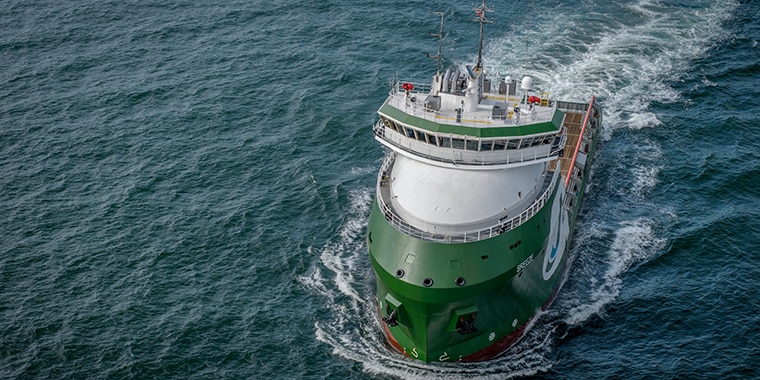Image: Jackson Offshore
With Opsealog’s performance-building platforms, offshore support vessel owner Jackson Offshore (JOO) boosted the efficiency of its operations and consequently its reputation in the Gulf of Mexico.
The Journey of Jackson Offshore (JOO) in the Gulf of Mexico
One of Opsealog’s long-standing partners, JOO owns and operates some of the finest offshore support vessels in the Gulf of Mexico. That’s not just its view, it’s feedback the company recently received from one of its charterers.
JOO is headquartered in New Orleans and has been operating in the Gulf of Mexico since 2011. The company currently owns six platform supply vessels (PSVs), which are chartered by major oil companies (including BP, Chevron and Shell), and two fast support intervention vessels (FSIVs).
The Challenge: Meeting Charterer’s Demands
JOO has always sought innovative solutions and new technologies, with the company working as a team to exceed the expectations of their charterers. After all, charterers are always asking for more information and higher performance levels as they strive to ensure the efficiency of their projects.
It’s common for charterers to request information such as vessel fuel consumption based on operational profiles, allowing them to better monitor the fleet. The processes used to collect this data varies from company to company and, when done manually through paper, spreadsheets, and emails, can be time consuming. Crew often need to input the same data multiple times into different reports – which can be frustrating, especially when it is not clear how (and if) this information is being used.
It can also be challenging to achieve the granularity of information required by charterers for detailed analysis and monitoring when data is recorded in these traditional ways. Additionally, in JOO’s case, there were vessel-specific power system characteristics that needed to be considered when developing optimization strategies.
Read more: Data-driven fuel efficiency: A guide on how to use data analytics to boost OSV performance
The Jackson Offshore fleet
The 76-meter (250-foot) diesel-electric PSVs are Guido Perla & Associates 675J custom designs that feature optimized cargo capacity, improved fuel consumption, ease of maintenance, redundancy, excellent maneuverability, superb sea keeping and enhanced comfort levels for the 34 crew members the vessels can each accommodate.
The vessels are powered by two Caterpillar 3516C and two Caterpillar C32 engines. This means they can sail on the power provided by a single C32 engine, for example, so ensuring optimal fuel consumption, and pairing it with the procedures required for offshore tasks is essential. This is only made possible thorough in-depth knowledge of the vessels’ capabilities.
In addition, it is important for JOO’s management to monitor their fleet’s activities, and to be able to challenge some of the charterers’ schedules if they consider them to be sub-optimal.
The solution
Opsealog understood the technical challenges involved in the previous, manual reporting methods. We proposed a solution that would completely replace the manual process of collecting data in spreadsheets, essentially digitizing and centralizing JOO’s reporting. This involved the use of our Streamlog reporting solution on the vessels, and our Marinsights platform for onshore management.
A new combination of operational and technical insight enabled a better flow of information and analysis, with complete report automation offering previously unattainable levels of accuracy when it came to data analysis and visualization. As a result, JOO were able to identify performance improvement which in turn ensured optimal engine use. This gave JOO a substantial competitive advantage.
Read more: Brunei Shell Petroleum Co. and Opsealog to boost fuel efficiency and optimizing fleet operations
Opsealog’s Digital Transformation Solutions
Streamlog is a modular onboard reporting software that simplifies daily reporting onboard vessels. It was developed in consultation with key stakeholders in the maritime and offshore industry. The digitalized process facilitates data entry from multiple sources – including onboard personnel, as well as third-party providers – saving time and reducing the risk of errors. An optimized online dashboard presents data in a way that allows users to easily organize, extract, and analyze it, and the Streamlog system’s modularity enables users to modify it to suit their specific needs.
Multiple data sources, including Streamlog, drive Marinsights, a performance management application. The platform monitors and optimizes marine offshore operations, bringing together data integration and visualization.The system leverages a robust cloud-based platform, business intelligence tools, and dashboards, integrating them with marine consulting services to provide fuel consumption and emissions reductions, cost savings, as well as enhanced fleet utilization. This resource optimization allows our clients to gain new levels of efficiency which benefits their partners, and ensures they remain competitive in their respective markets.
Results
Today, Excel spreadsheets are no longer utilized aboard JOO vessels, resulting in significantly reduced time spent on data entry. Additionally, thanks to our services, JOO can flag high-consuming operations, such as vessels remaining at standby for more than 10 hours in 500-meter exclusion zones.
“Collaboration with Opsealog to fully digitize our PSV fleet in the Gulf of Mexico has been a success,” says Matthew Rigdon, COO at Jackson Offshore. “With improved visibility, centralized data, and optimized service delivery, we have achieved greater efficiency. We recommend them as a partner to achieve a successful digital transformation.”
JOO continues to enjoy the benefits of its excellent reputation amongst charterers, and we look forward to our continued partnership with them. It began in 2020, and together we continue to expand innovative solutions for the every-day operational challenges faced by both shipowner and charterers.
Read more: 5 data-driven steps to boost Marine Offshore Efficiency

